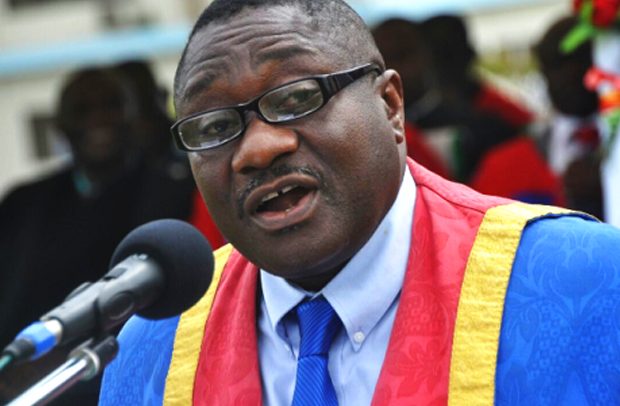Prof. Mawutor Avoke
The Supreme Court, in a ruling yesterday, overturned the decision by a Winneba High Court which resulted in the removal of Prof. Mawutor Avoke from office as Vice Chancellor of the University of Education, Winneba.
It would be recalled that following the High Court’s ruling in December 2017, the embattled Vice Chancellor and some top officers of the University were removed from office.
Subsequently, Rev. Prof. Francis Anthony Afful-Broni was inducted into office as the 4th Vice Chancellor of UEW, even though a suit challenging Prof. Avoke’s dismissal was pending in court.
But the Supreme Court, in a unanimous decision yesterday, observed that the High Court at the time failed to take evidence from the parties involved in the case before granting judgment, which was a gross violation of the rule of natural justice.
According to the justices of the Supreme Court, the Winneba High Court’s actions amounted to an error of law patent on the record.
Raymond Atuguba, a former counsel of Prof. Avoke, described his removal from office as politically motivated and urged President Akufo-Addo not to attend the induction ceremony of Prof. Afful-Broni.
In an article, Prof. Atuguba stated that he was alarmed by President Akufo-Addo’s involvement given his “admirable rule of law credentials.”
Prof. Atuguba, who claimed ‘unseen hands’ were manipulating proceedings, stopped representing the former Vice-Chancellor in open court.
Background
It would be recalled that in 2017, the Winneba High Court ordered Prof Avoke to step aside until the case brought against him and the University’s Governing Council was determined.
The case was brought before the court by one Supi Kofi Kwayera, who claimed the dismissed Vice Chancellor and the Finance Officer were operating under the institution’s defunct governing council.
The plaintiff argued that University’s Council’s mandate had expired in November 2013, but the Education Ministry failed to constitute a new Governing Council for the university and rather allowed the defunct Governing Council, which had no mandate whatsoever to continue the functions of a properly constituted Council.
In addition, he accused Prof Avoke of financial and procurement irregularities.
As a result, the court, in July 2017, ordered Prof Avoke to step aside until a case brought against him and the University’s Governing Council was determined.
Again, in July Prof Avoke, along with four others- the Finance Officer, Dr. Theophilus Senyo Ackorlie; Daniel Tetteh, Mary Dzimey and Frank Owusu Boateng, were interdicted by the school after it emerged that some vital documents at some offices at the centre of an ongoing investigation had disappeared.
They were subsequently found guilty of procurement and other financial irregularities in December 2017.
The irregularities had to do with the monies paid to the contractors of the North Campus Roads project.
In August 2018, the UEW Governing Council dismissed the five principal officers of the institution after a fact-finding committee had been set up to look into the matter.
Prof Avoke maintained his innocence and challenged his indictment in court.
He took the case to the Accra High Court (Labour Division), but it was beyond its jurisdiction, forcing him take the matter to the Supreme Court.
Interpretation
Meanwhile, some individuals and media houses have been interpreting the Supreme Court’s ruling to mean the reinstatement of Prof. Avoke.
But Member of Parliament (MP) for Effutu, Afenyo Markin, who doubles as the lawyer for the plaintiff, said the Supreme Court’s ruling has nothing to do with the dismissal of Prof. Avoke.
According to him, the case is a separate issue relating to a relief that Prof. Avoke sought in the case brought before the High Court.
“The matter that came to the court has nothing to do with the dismissal of Prof. Avoke,” he said, adding that “the former vice chancellor, Prof. Avoke was dismissed by the Governing Council of the University and he was not dismissed by a court order.”
“Avoke was not a party in his suit at the High Court to claim victory. He went under certiorari to say that the decision of the High Court should be quashed because there must be full evidence taken. Now what that means is that any citizen can apply for that relief, but he didn’t apply for a relief to be reinstated because it is not the court that dismissed him,” the lawyer said.
Interested Parties
Some legal experts have argued that per the ruling Prof. Avoke and Dr. Ackorlie should have been allowed to join the case at the Winneba High Court as interested parties.
They said that the case at the Winneba High Court should start all over with the two aforementioned persons given the chance to give evidence.
“The interdiction of Prof. Avoke and his colleagues and their subsequent dismissal were done by the Governing Council of the University of Education, Winneba based on the work of the fact-finding committee,” they stated.
By Melvin Tarlue


